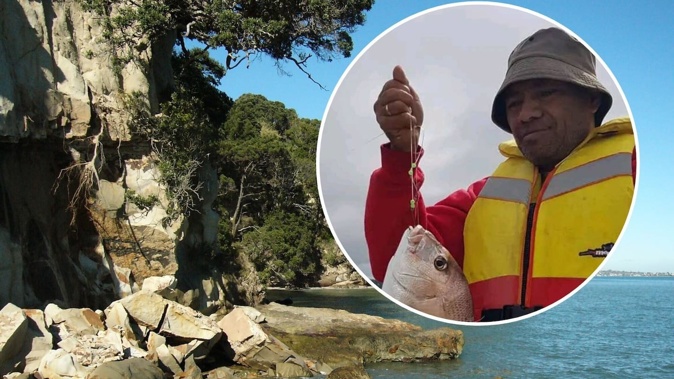
A midwinter fishing trip for three men turned to tragedy when their boat capsized in cold, choppy seas and only two made it ashore.
Church leader Tēvita Heimuli Moeakiola drowned during the 30 or 40 minutes it took the men to swim to shore on a dark night in 2022.
The 51-year-old was found the following afternoon, floating near the shore at Musick Point, a headland near Bucklands Beach in East Auckland.
Coroner Rachael Schmidt-McCleave said in her findings released today that a number of factors contributed to his accidental drowning, including that he was not wearing a lifejacket.
A Maritime New Zealand (MNZ) report stated that hypothermia was likely a contributing factor given sea temperatures at the time were 16.4 C.
Moeakiola moved to New Zealand from Tonga in 2006. His death left his wife, Paea Vaitohi, and family “heartbroken” and in disbelief, NZME reported at the time.

Tēvita Moeakiola drowned during a winter fishing trip in 2022.
His son, Salesio Moeakiola, described his father as a hard-working man who was always ready with a smile and who was a good dad to his four sons.
“He loved fishing and always put God first in everything he did.”
Tributes on social media described him as a selfless individual who always gave up his time for church and kāinga.
Moeakiola worked as a builder and lived in Manurewa with his wife and extended family members.
He was fit, healthy and active, and was a confident and competent swimmer, according to police witness statements.
Gone fishing
About midday on June 18, 2022, Moeakiola, his brother-in-law, Pita Setefano, and a work friend, Tēvita Havili, headed off on a pre-planned fishing trip.
The five to six-metre “family boat” they launched from the ramp at Half Moon Bay Marina had a 90-horsepower outboard engine which could be “notoriously difficult to start”.
MNZ examined the boat later and found it was in sub-standard condition with rotten wood in some sections, and a large hole near the back of the hull.
There were signs of attempts at repairing it with aluminium sheeting secured by fibreglass resin matting.
The forecast that day was for northeast winds rising to 15 knots in the afternoon and evening with choppy seas.
The trio motored to their normal fishing spot on the western side of Motuihe Island where they fished for the afternoon.
Coroner Schmidt-McCleave said there were always three life jackets on the boat, but a Facebook live post made that day showed none of them wearing one.
About 6pm, they started to head back to the shore.
The coroner said Moeakiola spoke to his wife at the time and told her he was “waiting to make sure fisheries officers left the area in case they had any undersize fish”.
Dark night, rising wind, no life jacket
It was dark and there was a light wind. Moeakiola was steering the boat and was suddenly met with a stronger breeze and increased swell as they rounded the island.
Between Brown’s Island and the tip of Musick Point, the engine slowed and the wake breached the back and side of the vessel.
As they began to bail out, the bow lifted and the boat capsized, throwing all three men into the water.
MNZ considered the hole in the hull likely caused the vessel to founder and capsize in the manner described by the survivors.
Setefano used a life jacket that had been in the boat to stay afloat, and Havili took hold of a petrol can.
Havili later told police that Moeakiola was not wearing a life jacket, and still had his shoes on and needed to take them off because they were heavy.
They began swimming towards Musick Point, but Moeakiola turned and started swimming back to the boat.
He rejoined the others when they encouraged him to stay with them and all three continued to shore, initially calling to each other as they swam.
Havili heard Setefano calling back to him but Moeakiola only replied once and seemed to be drifting further away.
Boat found next day
About 30-40 minutes later, Setefano and Havili reached the shore but Moeakiola did not.
After shouting for several minutes but hearing nothing, they walked to the nearest house and called emergency services.
The boat was found early the next morning, washed up and overturned on Musick Point at the mouth of the Tāmaki River.
Moeakiola’s body was found nearby later that day.
Coroner Schmidt-McCleave said it was likely that he succumbed to the cold water temperatures closer to the time he went missing than to when he was found.
She said in her recommendations that an often-repeated, and often ignored message, was that lifejackets were imperative to survival in the water.
“It is very possible that, had Mr Moeakiola been wearing a lifejacket, he may have been able to reach the shore with the other survivors.”
Water Safety New Zealand spokesman Rob Hewitt, who survived 75 hours adrift at sea himself, said wearing a lifejacket was the simplest and most effective way to reduce drowning fatalities in New Zealand.
“Too many of our men – often experienced, capable, confident – are still heading out not wearing lifejackets. We are not invincible," Hewitt said.
Coroner Schmidt-McCleave said if a trip report had been made with Coastguard it was possible it would have raised the alarm earlier, if overdue reports were notified to them.
The coroner endorsed MNZ’s recommendation that two forms of communication be carried when heading out boating, such as a mobile phone and a waterproof hand-held marine radio.
Tracy Neal is a Nelson-based Open Justice reporter at NZME. She was previously RNZ’s regional reporter in Nelson-Marlborough and has covered general news, including court and local government for the Nelson Mail.
Take your Radio, Podcasts and Music with you











